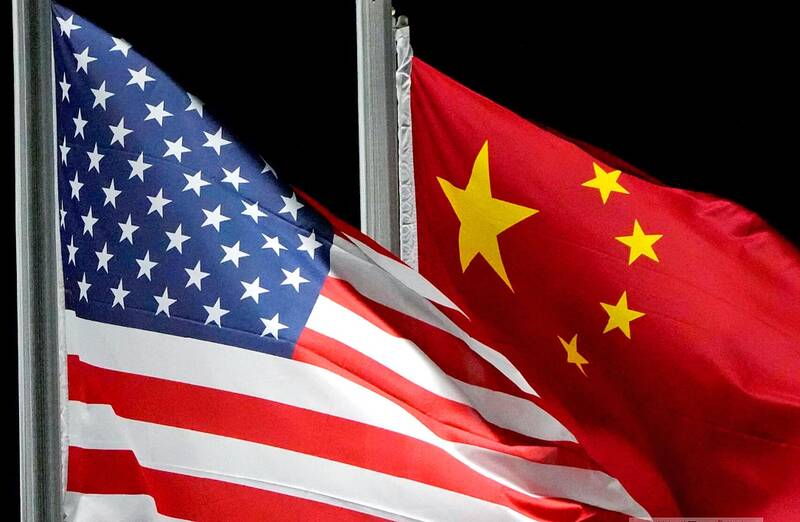A US investigation into Chinese government efforts to hack into US telecommunications networks has revealed a “broad and significant” cyberespionage campaign aimed at stealing information from people who work in government and politics, the FBI said on Wednesday.
Hackers affiliated with Beijing have compromised the networks of “multiple” telecommunications companies to obtain customer call records and gain access to the private communications of “a limited number of individuals,” the FBI and the US Cybersecurity and Infrastructure Security Agency said in a joint statement.
The FBI did not identify any of the individuals targeted by the hackers, but said that most of them “are primarily involved in government or political activity.”

Photo: AP
The hackers also sought to copy “certain information that was subject to US law enforcement requests pursuant to court orders,” the FBI said, suggesting that the hackers might have been trying to compromise programs like those subject to the Foreign Intelligence Surveillance Act, which grants US spy agencies powers to surveil the communications of people suspected of being agents of a foreign power.
The warning comes after several high-profile hacking incidents that US authorities have linked to China, part of what they say is an effort to steal technological and government information, while also targeting vital infrastructure such as the electrical grid.
Officials are working with the telecommunications industry and people affected by hacking to shore up defenses against continuing attempts at cyberespionage, the statement said.
“We expect our understanding of these compromises to grow,” it said.
China has rejected accusations by US officials that it engages in cyberespionage directed against Americans.

AIR SUPPORT: The Ministry of National Defense thanked the US for the delivery, adding that it was an indicator of the White House’s commitment to the Taiwan Relations Act Deputy Minister of National Defense Po Horng-huei (柏鴻輝) and Representative to the US Alexander Yui on Friday attended a delivery ceremony for the first of Taiwan’s long-awaited 66 F-16C/D Block 70 jets at a Lockheed Martin Corp factory in Greenville, South Carolina. “We are so proud to be the global home of the F-16 and to support Taiwan’s air defense capabilities,” US Representative William Timmons wrote on X, alongside a photograph of Taiwanese and US officials at the event. The F-16C/D Block 70 jets Taiwan ordered have the same capabilities as aircraft that had been upgraded to F-16Vs. The batch of Lockheed Martin

GRIDLOCK: The National Fire Agency’s Special Search and Rescue team is on standby to travel to the countries to help out with the rescue effort A powerful earthquake rocked Myanmar and neighboring Thailand yesterday, killing at least three people in Bangkok and burying dozens when a high-rise building under construction collapsed. Footage shared on social media from Myanmar’s second-largest city showed widespread destruction, raising fears that many were trapped under the rubble or killed. The magnitude 7.7 earthquake, with an epicenter near Mandalay in Myanmar, struck at midday and was followed by a strong magnitude 6.4 aftershock. The extent of death, injury and destruction — especially in Myanmar, which is embroiled in a civil war and where information is tightly controlled at the best of times —

China's military today said it began joint army, navy and rocket force exercises around Taiwan to "serve as a stern warning and powerful deterrent against Taiwanese independence," calling President William Lai (賴清德) a "parasite." The exercises come after Lai called Beijing a "foreign hostile force" last month. More than 10 Chinese military ships approached close to Taiwan's 24 nautical mile (44.4km) contiguous zone this morning and Taiwan sent its own warships to respond, two senior Taiwanese officials said. Taiwan has not yet detected any live fire by the Chinese military so far, one of the officials said. The drills took place after US Secretary

THUGGISH BEHAVIOR: Encouraging people to report independence supporters is another intimidation tactic that threatens cross-strait peace, the state department said China setting up an online system for reporting “Taiwanese independence” advocates is an “irresponsible and reprehensible” act, a US government spokesperson said on Friday. “China’s call for private individuals to report on alleged ‘persecution or suppression’ by supposed ‘Taiwan independence henchmen and accomplices’ is irresponsible and reprehensible,” an unnamed US Department of State spokesperson told the Central News Agency in an e-mail. The move is part of Beijing’s “intimidation campaign” against Taiwan and its supporters, and is “threatening free speech around the world, destabilizing the Indo-Pacific region, and deliberately eroding the cross-strait status quo,” the spokesperson said. The Chinese Communist Party’s “threats